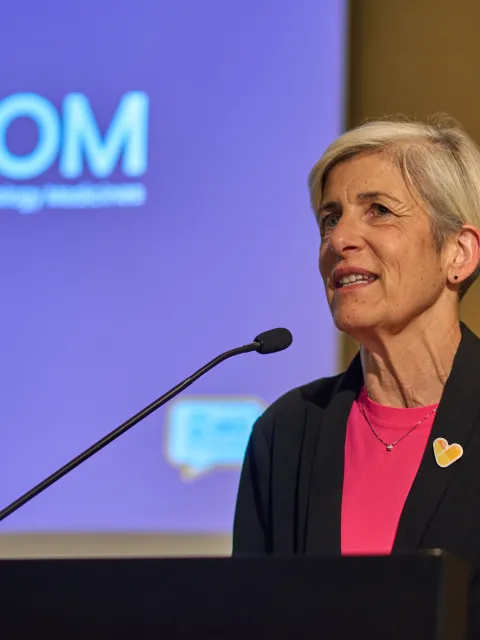Access to Oncology Medicines Coalition
A UICC-led initiative pioneering access solutions for cancer medicines

The Access to Oncology Medicines Coalition (ATOM Coalition), led by the Union for International Cancer Control (UICC), is a global initiative in collaboration with over 40 partners across the private and civil society sectors. It aims to reduce cancer-related suffering and deaths by addressing the barriers to availability, affordability, and appropriate use of oncology medicines in low- and lower-middle income countries (LLMICs).
Building on UICC’s long-standing advocacy for the global availability of cancer medicines, the ATOM Coalition was created under UICC’s leadership in 2022 to further drive collective, coordinated action across the public, private and civil society sectors at the global and country level.
The access challenge
The global cancer community faces a stark challenge: in 2020, the number of new cancer cases worldwide reached almost 20 million and the estimated number of cancer-related deaths tipped over 10 million. A staggering 70% of total cancer mortalities occur in low- and middle-income countries, underscoring a significant disparity in the lack of access to essential oncology medicines and diagnostics. In fact, more than 50% of the cancer drugs on the World Health Organization Model Lists of Essential Medicines List (WHO EML) are unavailable in LMICs. Without access to them, people diagnosed with cancer face drastically reduced health outcomes and quality of life.
Limited access to essential cancer medicines in LMICs stem from a number of complex issues, including fragile health systems, insufficient infrastructure, a lack of regulatory frameworks, inefficient procurement practices and supply chains, inadequate diagnostics and pathology, and a lack of trained health professionals. These are key barriers that the ATOM Coalition will focus on.
Transforming access to cancer medicines
By channeling the diverse expertise and experience of UICC's global network and Coalition partners to harness collective resources for greater scale and efficiency, the ATOM Coalition is innovating a new approach to access to cancer medicines in LLMICs.
This approach complements, enhances and amplifies the impact of existing access programmes and supports their growth by developing synergies and overcoming shared challenges. Ultimately, these coordinated efforts will help to improve connectivity between different access initiatives for maximum impact.
ATOM Coalition goals
-
increase the availability and affordability of cancer medicines
-
increase the capacity to use these medicines appropriately
The ATOM Coalition approach is centred around:

Shared and strong governance
Executive Committee
The Executive Committee is responsible for establishing and overseeing the key strategic objectives and measures for success. Core responsibilities include aligning on the Coalition's fundamental elements, including its business, funding, operating, and governance models.
Medicines and Technologies Committee (MTC)
Country Support Committee
Expert Advisory Groups
Secretariat
UICC serves as secretariat to lead on strategy, foster stakeholder cooperation, and coordinate efforts and activities at the global and country levels.
Join the ATOM Coalition
Be part of the UICC-led efforts to reduce suffering and deaths caused by cancer in low- and lower-middle income countries through improved access to and use of essential cancer medicines.
